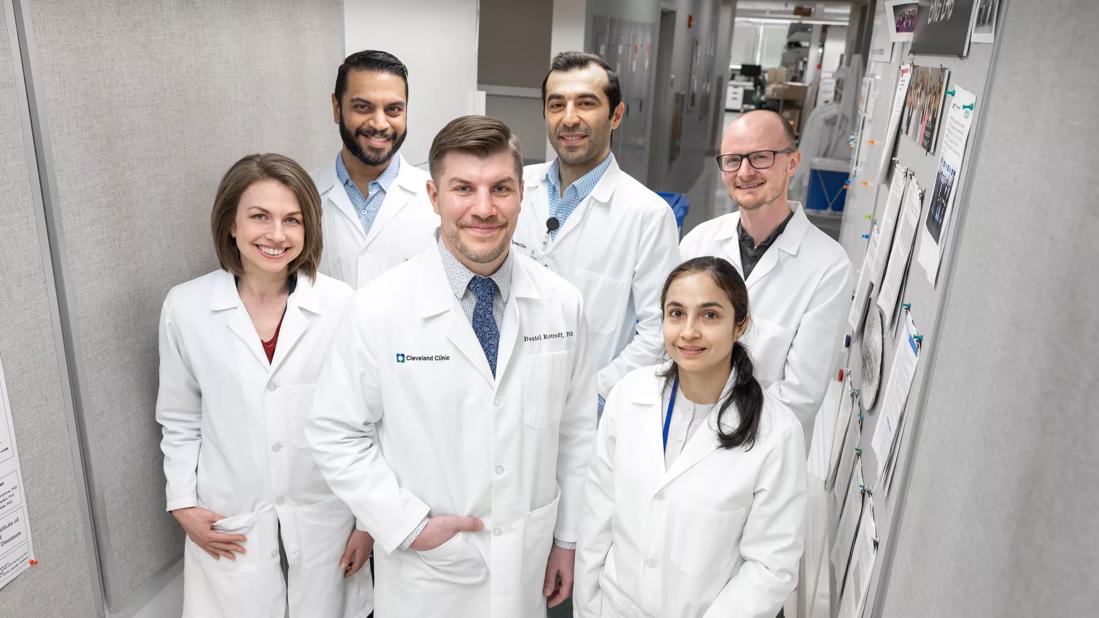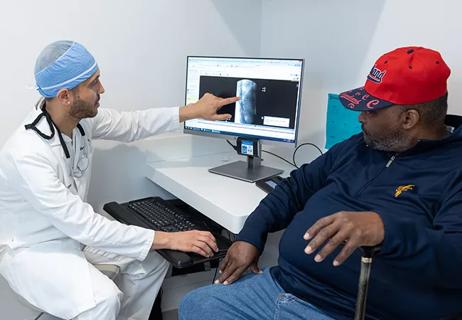Through collaboration, the Center for Quantitative Metabolic Research will help improve Cleveland Clinic’s standing as a leader for Type 2 diabetes and obesity research

When notified that Cleveland Clinic’s NIH funding for diabetes and obesity ranked 39 out of 80, it was clear to Daniel Rotroff, PhD and Marcio Griebeler, MD, and, that we weren’t reaching our full potential. This was the impetus for the creation of the Center for Quantitative Metabolic Research, which will begin in January 2023. The center will help improve collaboration and research in the diabetes and obesity fields.
Advertisement
Cleveland Clinic is a non-profit academic medical center. Advertising on our site helps support our mission. We do not endorse non-Cleveland Clinic products or services. Policy
The mission of the Center is to promote transdisciplinary clinical research that will improve the prevention, detection and treatment of metabolic disorders. Dr. Rotroff will serve as the director of the Center, while Dr. Griebeler will act as the clinical director.
“The prevalence of Type 2 diabetes and obesity continues to increase and are linked to a vast array of other health problems with major impacts on the lives of patients and the health care system overall. Current treatments require a trial-and-error approach and tools that can provide personalized and targeted treatments for patients are desperately needed. This Center aims to bring together investigators that can come up with innovative strategies to deliver these tools,” says Dr. Rotroff.
“Overall, Cleveland Clinic has an excellent program for treating patients with obesity and diabetes,” says Dr. Griebeler. “But from the research perspective, we are not combining efforts, and many people are working on their own. We are likely missing opportunities here. So, the goal of this effort is to establish Cleveland Clinic as the leader for Type 2 diabetes and obesity research.”
To help further spark collaboration, the center will be under the umbrellas of both the Endocrinology & Metabolism Institute (EMI) and the Lerner Research Institute (LRI). This will ensure that researchers, endocrinologists, diabetologists and obesity specialists can come together to help plan and develop state-of-the-art translational research projects. One of the things Dr. Griebeler is most excited about is the Center’s ability to provide support at every step.
Advertisement
“When we were developing this idea, we wrote down a few objectives that we wanted to achieve with the Center,” explains Dr. Griebeler. “First, we want to foster creative solutions to clinical challenges and metabolic disorders. We want to assemble interdisciplinary investigative teams that can compete for NIH funding. And through both of those objectives, we expect to increase research output and drive innovation in patient care. So that’s kind of the idea; we’ll have these meetings where clinicians and researchers can come together and present their ideas and we can help them develop everything — the protocols, registries, support for pilot projects, data analysis and all those things required to do the research and make it competitive for external funding.”
“Ideally, this structure will be able to assist people who have identified a research gap somewhere but may not be sure how to get started or need to identify a collaborator that can give them that competitive edge,” says Dr. Rotroff. “For example, we can connect this person with someone who has an appropriate animal model or provide them with someone that can build machine-learning models, someone that can help them identify the right funding mechanism and prepare the grants. The center will help them with all those things. These kinds of things can be intimidating and difficult for people who are not well-versed in the grant proposal process or others may have an existing research program that could benefit from working with a collaborator that brings different expertise.”
Advertisement
An advisory board will help steer the Center and will be made up of specialists from a multitude of areas. Along with Drs. Rotroff and Griebeler, the other board members and their areas of expertise include:
“I think the opportunities for collaboration are especially exciting because sometimes we get stuck in our own little bubble, and we forget to seek out input from others that may foster new and fresh ideas,” says Dr. Rotroff. The Center will interface closely with other existing centers such as the Healthcare Delivery & Implementation Science Center, led by Anita Misra-Hebert, MD, and the Diabesity Center in the EMI. “I believe the best innovation happens when experts come together from different disciplines to share their own unique skillsets, perspectives, and expertise. That creates opportunities for totally new ideas to develop. It’s exciting to imagine the possibilities and the impact this could have on patients.”
Advertisement
Advertisement

Association revises criteria for the diagnosis and resolution of severe conditions

Less than 50% of patients with diabetes get appropriate ophthalmic screening through primary care referrals

Familiarity will enhance its accessibility for patients with diabetes

New study counters earlier findings linking drugs with eye disease

Study highlights the value of quantitative ultra-widefield angiography

Longevity in healthcare, personal experiences may provide caregivers with false sense of confidence

Maternal-fetal medicine specialists, endocrinologists and educators team up

Spinal cord stimulation can help those who are optimized for success